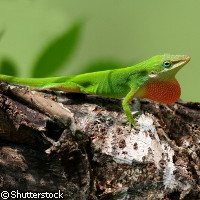Distance is key in speciation
A new EU-funded genetic study from the UK is offering evolutionists a new twist in biodiversity: lizards originating from the same island but living in different, yet adjacent habitats are inter-breeding less than lizards originating from different islands. The outcome is part of the SPECIATION FACTORS ('Testing the relative importance of factors in speciation: the Martinique Anoles') project, which received almost EUR 160,000 under the Marie Curie scheme of the EU's Sixth Framework Programme (FP6). The findings, published in the Public Library of Science (PLoS) Genetics journal, provide insights into the role of geographical isolation in speciation. For years, scientists have conducted evolutionary studies on islands around the globe, such as in Indonesia, Asia, and the Galapagos off the west coast of South America. These islands have helped researchers determine the conventional theory of allopathic speciation, in which closely related populations are separated geographically, restricting the gene flow between the groups. Martinique in the Lesser Antilles as we know it today is made up of a number of ancient islands that have only recently coalesced into a single entity. Based on phylogeny and geology data, these ancient islands have been home to a tree lizard (anole) species for the last six to eight million years. 'Over the last 150 years, since Darwin's study of islands and his "Origin of Species", island archipelagos have played a central role in the understanding of evolution and how species multiply (speciation),' the authors write. 'Islands epitomise the conventional view of geographic (allopatric) speciation, where genomes diverge in isolation until accumulated differences result in reproductive isolation and the capacity to coexist without interbreeding.' Professor Roger Thorpe from the School of Biological Sciences at Bangor University in the UK, along with his colleagues, genetically tested the lizards for reproductive isolation from one another. The use of selectively neutral genetic markers helped the team determine that the anoles are freely exchanging genes and are not behaving as separate species. Furthermore, according to the researchers, greater genetic isolation exists between conspecifics from diverse habitats than between those lizards hailing from separate ancient islands. 'Indeed, there is more genetic isolation between adjacent populations of the same species from different habitats than between separate putative allospecies from the ancient islands,' the authors write. 'This rejects allopatric speciation in a case study from a system thought to exemplify it, and suggests the potential importance of ecological speciation.' Commenting on what steps need to be taken next, Professor Thorpe said: 'The next step is to identify the genes controlling the traits influencing the process of speciation.'
Countries
United Kingdom



